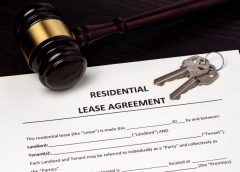Disagreements about the terms of a lease are a common issue between landlords and their tenants. Understanding how landlords should handle a lease agreement dispute can be the difference between a resolution that favors your position and one that escalates the conflict. Learn solid advice below.
Prioritize Open Communication
The first and often most effective step in resolving any dispute lies in open and honest communication. Initiate a dialogue with your tenant to understand their perspective and express your concerns clearly. This not only opens the path to a potential amicable resolution but also helps maintain a positive landlord-tenant relationship. Make sure to keep all communication professional and document every interaction, as this can be invaluable if the dispute advances to legal proceedings.
Seek Legal Advice
Lease agreement disputes are actually one of the most common legal issues in property management, but navigating the complexities of lease agreements and tenant laws can be challenging. Seeking advice from a legal expert specializing in property law ensures that you understand your rights and obligations as a landlord. A lawyer can also review the specifics of the dispute and recommend the best course of action, whether it’s negotiating a settlement or preparing for a court case. Legal advice early on can prevent costly mistakes and equip you with the strategies to handle the dispute effectively.
Keep Comprehensive Records
Documentation plays a critical role in resolving lease agreement disputes. Maintain a detailed record of all communications, agreements, payments, and notices related to the tenancy. This includes the original lease agreement, any amendments, email exchanges, and notes from phone or in-person conversations. These documents can serve as evidence to support your position, whether in negotiations with the tenant or in a formal legal setting.
Consider Mediation
If direct communication does not lead to a resolution, mediation can be a valuable next step. This involves a neutral third party who works with both the landlord and tenant to facilitate a mutually acceptable agreement. Mediation offers a less confrontational and often less expensive alternative to court proceedings. It allows both parties to discuss their issues in a structured setting and work toward a practical solution with the help of the mediator.
Understanding how landlords should handle a lease agreement dispute involves a multifaceted approach that prioritizes communication, legal counsel, meticulous documentation, and mediation. By addressing the dispute proactively and equipping yourself with the necessary knowledge and resources, you can work towards a resolution that is fair and favorable for all involved parties.





